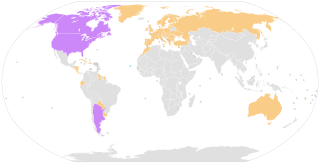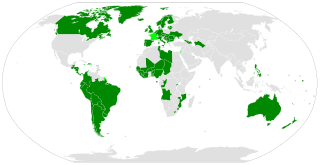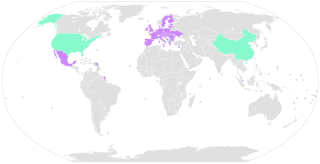The European Convention on Nationality was signed in Strasbourg on 6 November 1997. It is a comprehensive convention of the Council of Europe dealing with the law of nationality. The convention is open for signature by the member States of the Council of Europe and the non-member States which have participated in its elaboration and for accession by other non-member States. The Convention came into force on 1 March 2000 after ratification by 3 countries. As of 2021, the convention has been signed by 29 countries and ratified by 21 of those countries.
Conflict of laws is the set of rules or laws a jurisdiction applies to a case, transaction, or other occurrence that has connections to more than one jurisdiction. This body of law deals with three broad topics: jurisdiction, rules regarding when it is appropriate for a court to hear such a case; foreign judgments, dealing with the rules by which a court in one jurisdiction mandates compliance with a ruling of a court in another jurisdiction; and choice of law, which addresses the question of which substantive laws will be applied in such a case. These issues can arise in any private-law context, but they are especially prevalent in contract law and tort law.

The Hague Convention Abolishing the Requirement of Legalisation for Foreign Public Documents, the Apostille Convention, or the Apostille Treaty, is an international treaty drafted by the Hague Conference on Private International Law (HCCH). It specifies the modalities through which an official seal on a document, issued in one of the contracting states, can be certified for legal purposes in all the other contracting states. A certification under the terms of the convention is called an apostille or Hague apostille. It is an international certification comparable to a notarisation in domestic law, and normally supplements a local notarisation of the document. If the convention applies between two countries, such an apostille is sufficient to certify a document's validity, and removes the need for double-certification, by the originating country and then by the receiving country.

The Hague Conference on Private International Law (HCCH) is an intergovernmental organisation in the area of private international law, that administers several international conventions, protocols and soft law instruments.

The Hague Convention on the Civil Aspects of International Child Abduction or Hague Abduction Convention is a multilateral treaty developed by the Hague Conference on Private International Law (HCCH) that provides an expeditious method to return a child internationally abducted by a parent from one member country to another.
In modern society, the role of marriage and its termination through divorce have become political issues. As people live increasingly mobile lives, the conflict of laws and its choice of law rules are highly relevant to determine:

The Brussels Regime is a set of rules regulating which courts have jurisdiction in legal disputes of a civil or commercial nature between individuals resident in different member states of the European Union (EU) and the European Free Trade Association (EFTA). It has detailed rules assigning jurisdiction for the dispute to be heard and governs the recognition and enforcement of foreign judgments.
In conflict of laws, habitual residence is the standard used to determine the law which should be applied to determine a given legal dispute or legal entitlement. It can be contrasted with the law on domicile, traditionally used in common law jurisdictions to do the same thing.

The Hague Convention on the Law Applicable to Trusts and on their Recognition, or Hague Trust Convention is a multilateral treaty developed by the Hague Conference on Private International Law on the Law Applicable to Trusts. It concluded on 1 July 1985, entered into force 1 January 1992, and is as of September 2017 ratified by 14 countries. The Convention uses a harmonised definition of a trust, which is the subject of the convention, and sets Conflict rules for resolving problems in the choice of the applicable law. The key provisions of the Convention are:

The Hague Convention on parental responsibility and protection of children, or Hague Convention 1996, officially Convention of 19 October 1996 on Jurisdiction, Applicable Law, Recognition, Enforcement and Co-operation in respect of Parental Responsibility and Measures for the Protection of Children or Hague Convention 1996 is a convention of the Hague Conference on Private International Law. It covers civil measures of protection concerning children, ranging from orders concerning parental responsibility and contact to public measures of protection or care, and from matters of representation to the protection of children's property. It is therefore much broader in scope than two earlier conventions of the HCCH on the subject.

The Convention on the Reduction of Statelessness is a 1961 United Nations multilateral treaty whereby sovereign states agree to reduce the incidence of statelessness. The Convention was originally intended as a Protocol to the Convention Relating to the Status of Refugees, while the 1954 Convention Relating to the Status of Stateless Persons was adopted to cover stateless persons who are not refugees and therefore not within the scope of the Convention Relating to the Status of Refugees.

International child abduction in Japan refers to the illegal international abduction or removal of children from their country of habitual residence by an acquaintance or family member to Japan or their retention in Japan in contravention to the law of another country. Most cases involve a Japanese mother taking her children to Japan in defiance of visitation or joint custody orders issued by Western courts. The issue is a growing problem as the number of international marriages increases. Parental abduction often has a particularly devastating effect on parents who may never see their children again.
International matrimonial law is an area of private international law. The area specifically deals with relations between spouses and former spouses on issues of marriage, divorce and child custody. In the last 50 years, the States Members of the Hague Conference on Private International Law have attempted to harmonize domestic matrimonial laws and judicial rulings across international borders in these areas.
The term international child abduction is generally synonymous with international parental kidnapping,child snatching, and child stealing. However, the more precise legal usage of international child abduction originates in private international law and refers to the illegal removal of children from their home by an acquaintance or family member to a foreign country. In this context, "illegal" is normally taken to mean "in breach of custodial rights" and "home" is defined as the child's habitual residence. As implied by the "breach of custodial rights," the phenomenon of international child abduction generally involves an illegal removal that creates a jurisdictional conflict of laws whereby multiple authorities and jurisdictions could conceivably arrive at seemingly reasonable and conflicting custodial decisions with geographically limited application. Such a result often strongly affects a child's access and connection to half their family and may cause the loss of their former language, culture, name and nationality, it violates numerous children's rights, and can cause severe psychological and emotional trauma to the child and family left behind.

Brussels II Regulation (EC) No 1347/2000, which came into force on 1 March 2001, sets out a system for the allocation of jurisdiction and the reciprocal enforcement of judgments between European Union Member States and was modelled on the 1968 Brussels Convention on Jurisdiction and the Enforcement of Judgments in Civil and Commercial Matters. It was intended to regulate domains that were excluded from the Brussels Convention and Brussels I. The Brussels II Regulation deals with conflict of law issues in family law between member states; in particular those related to divorce and child custody. The Regulation seeks to facilitate free movement of divorce and related judgments between Member States.

The Hague Convention on the International Recovery of Child Support and Other Forms of Family Maintenance, also referred to as the Hague Maintenance Convention or the Hague Child Support Convention is a multilateral treaty governing the enforcement of judicial decisions regarding child support extraterritorially. It is one of a number of conventions in the area of private international law of the Hague Conference on Private International Law in 2007. The convention is open to all states as well as to Regional Economic Integration Organizations as long as they are composed of sovereign states only and have sovereignty in the content of the convention. The convention entered into force on 1 January 2013 between Norway and Albania, with Bosnia-Herzegovina (2013), Ukraine (2013), the European Union, Montenegro (2017), United States (2017), Turkey (2017), Kazakhstan (2017), Brazil (2017), Honduras (2017), Belarus (2018), Guyana (2020), Nicaragua (2020), United Kingdom (2021), Serbia (2021) and New Zealand (2021) following suit. Because the EU acceptance of the convention applies in 27 EU countries, the convention applies in 42 countries worldwide.

The Maintenance Regulation (EC) No 4/2009, formally the Council Regulation (EC) on jurisdiction, applicable law, recognition and enforcement of decisions and cooperation in matters relating to maintenance obligations, is a European Union Regulation on conflict of law issues regarding maintenance obligations. The regulation governs which courts have jurisdiction and which law it should apply. It further governs the recognition and enforcement of decisions. The regulation amends the Brussels Regulation, which covers jurisdiction in legal disputes of a civil or commercial nature between individuals more broadly.

The Hague choice of court convention, formally the Convention of 30 June 2005 on Choice of Court Agreements, is an international treaty concluded within the Hague Conference on Private International Law. It was concluded in 2005, and entered into force on 1 October 2015. The European Union, Denmark, Mexico, Singapore and the United Kingdom are parties to the convention. China, Israel, North Macedonia, Ukraine and the United States signed the convention, but did not ratify.

The Hague Judgments Convention, formally the Convention of 2 July 2019 on the Recognition and Enforcement of Foreign Judgments in Civil or Commercial Matters is an international treaty concluded within the Hague Conference on Private International Law. It was concluded in 2019, and has not entered into force. The convention governs the recognition of judgements in civil and commercial matters.












